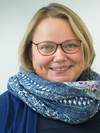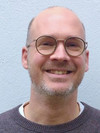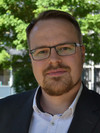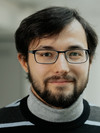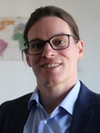Early Career Researchers
Jun. Professorship - Prof. Henrike Müller-Werkmeister
Rike's research uses time-resolved, mainly ultrafast, experiments to investigate structural dynamics in complex, bimolecular systems, ranging from carbohydrates to proteins and biological gels. Her group is operating a state-of-the art laser laboratory with 2D-IR spectroscopy as main methodology and capacity for transient IR/2D-IR and transient absorption spectroscopy as multi scale experiments from femtoseconds to milliseconds, in addition she and her team are involved in collaborative research at large scale facilities such as the European XFEL.
Heisenberg group - Dr. Sven Stripp
Sven employs vibrational spectroscopy and electrochemistry to study biological macromolecules that include transition metal cofactors. These enzymes use air as a substrate to catalyze H2 oxidation, N2 fixation, or CO2 reduction. Understanding their reaction mechanisms will assist in designing functional materials.
Since 2025 Svens’ research is funded by the Heisenberg program of the DFG.
Contact: sven.stripp@uni-potsdam.de
Heisenberg group - Dr. Ulrich Glebe
The group „Biohybrid Materials“ from Uli addresses various aspects related to the polymer-based stabilization of proteins. The research includes protein-polymer conjugates, enzyme/polymer complexes and immobilization of proteins. The applications of the hybrid materials lie in the fields of bioeconomy and biomedicine, for example the stabilization of polymer-degrading enzymes, enzymes that degrade antibiotics or therapeutic proteins to prolong their in vivo half-life.
Since 2024, Uli is funded by the Heisenberg program of the DFG.
Contact: ulrich.glebe.1@uni-potsdam.de
NanoMatFutur Group - Dr. Johannes Gurke
Johannes explores new approaches for the fabrication of complex device architectures to monitor biological processes, using among others lithographic 3D printing techniques. Here is one challenge, to process highly conductive polymeric materials with light. Further, his group explores techniques to modulate cellular processes in vivo using the concept of photopharmacology, especially its translation into biomedical research.
Since 2025 Johannes group is funded by the NanoMatFutur program of the BMBF.
Contact: johannes.gurke@uni-potsdam.de
DFG Eigene Stelle - Dr. Evgenii Titov
Evgenii researches photochemistry and photophysics of molecular systems using computational chemistry.
In particular, he is interested in photoinduced processes in multichromophoric and multiphotochromic structures.
Since 2021 Evgenii's research has been funded by the DFG (through "Eigene Stelle", SFB 1636, and individual research grant)
Contact: evgenii.titov.1@uni-potsdam.de
(Photo: Kevin Ryl (ZIM))
Emmy Noether Research Group - Dr. Matthias Hartlieb
Matthias research is focussed on polymer chemsitry and the deveopment of polymeric materials for biomedical applications. His groups develops new photo-polymerization techniques to enable easy access to complex macromolecules. A strong focus is on the design of new antimicrobial polymers/materials to adress the problem of antimicrobial resistance.
Since 2021 Matthias group is funded by the Emmy Noether program of the DFG
Contact: mhartlieb@uni-potsdam.de

